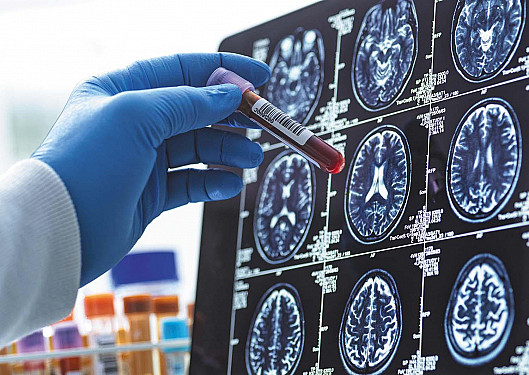Alzheimer’s disease vs. other types of dementia: Understanding the differences
Alzheimer's disease and dementia are often used interchangeably in casual conversation — but they're not the same.
- Reviewed by Howard E. LeWine, MD, Chief Medical Editor, Harvard Health Publishing; Editorial Advisory Board Member, Harvard Health Publishing
While Alzheimer’s disease is the most common type of dementia, it’s important to recognize other reasons for significant cognitive decline. The symptoms of the different types can be very similar, especially in the early stages of all dementias.
Learning more about the difference between Alzheimer’s disease and the other types of dementia can help you or a loved one better navigate a diagnosis or even take steps to reduce your risks.
What is dementia?
Dementia is defined as a loss over time of memory or other mental functions, or a change in mood or behavior that is severe enough to interfere with your ability to function at home, socially, or at work. It’s caused by physical changes in the brain that can result from various diseases and conditions.
Characteristics of dementia include:
- A decline in intellectual function.
- Changes in multiple types of mental function. In addition to memory, the condition may lead to changes in abstract thinking, language, reasoning and judgment, or visuospatial abilities. This characteristic distinguishes dementia not only from forgetfulness but also from conditions such as isolated amnesia (memory loss only) and speech deficits (caused by stroke, for example).
- Changes in mood, behavior, and personality, such as apathy, anxiety, depression, irritability, agitation, hallucinations, delusions, loss of empathy, or sleep or appetite changes.
- Difficulty with daily tasks, ranging from complex activities, such as managing finances, to simple personal care, such as bathing.
Common dementia symptoms
Symptoms of dementia typically emerge slowly, get worse over time and limit the person's ability to function. Here are some of the common symptoms of dementia.
Memory loss. Everyone has memory lapses from time to time. However, the memory loss of dementia is greater and affects your ability to function. For example, forgetting where you put your car key is normal. Forgetting how to use the key is a possible symptom of dementia.
Having trouble with complex mental tasks. A person may have difficulty balancing a checkbook, driving, knowing what day it is and learning new things. They may be inattentive and display poor judgment. Their mood and behavior may change. They may have problems with personal care, such as bathing.
Intermittent confusion, such as not recognizing their surroundings or familiar people. In some cases, a person with dementia may see or hear things that are not (hallucinations and delusions). They may get very agitated, and may withdraw from other people.
Alzheimer’s disease basics
Dementia is an umbrella term for a decline in cognitive ability. Alzheimer’s disease is a type of dementia, and it’s also the most common cause of dementia, accounting for 60 to 80% of all dementias.
Alzheimer’s is a specific disease characterized by the build-up in the brain of a sticky material known as amyloid plaque, and twisted fibers known as neurofibrillary tangles. Plaques and tangles are regarded as two hallmarks of Alzheimer’s disease.
As the disease takes hold, levels of brain chemicals called neurotransmitters decline. Adequate cognitive function requires abundant neurotransmitters to carry messages among billions of brain cells (neurons). Brain cells begin to die, and many connections between these cells — which are crucial for memory and other mental functions — also disappear. In advanced Alzheimer’s disease, the dramatic loss of neurons causes the brain to atrophy, or shrink.
Symptoms of Alzheimer’s
Here are some common symptoms of Alzheimer’s disease.
Trouble remembering things: Alzheimer’s disease affects short-term memory more than long-term memory. The individual may forget where they left things, or leave things in odd places (for example, putting shoes in the microwave). However, the person may easily recollect an event from decades prior. In later stages of the disease, long-term memory also suffers.
Mood or personality changes: Someone who used to be social and outgoing may become withdrawn. A person may also become stubborn, distrustful, angry, anxious, or depressed. They may lose interest in a favorite hobby or activity, experience a change in appetite, have trouble with insomnia or sleeping too much, or experience lack of energy or hopelessness.
Trouble completing routine daily tasks: For example, someone may forget how to use a computer, drive a car, or use a tea kettle. Eventually, they may forget how to lock the door, get dressed, or bathe.
Difficulty expressing thoughts. An individual may try describing an object rather than using its name — for example, referring to the telephone as “the ringer” or “that thing I call people with.” Reading or writing may also be impaired in later stages of the disease.
Impaired judgment: People might have trouble making decisions, solving problems, or planning. For example, they may no longer be able to balance a checkbook or pay bills.
Disorientation: We all know what it’s like to be driving and momentarily forget where we’re going. However, those with Alzheimer’s disease may get lost in their own neighborhood. They may also lose track of dates and time.
Unusual behavior: The individual may wander, become agitated, hide things, wear too few or too many clothes, become overly suspicious, engage in unsafe behaviors, or use foul language.
Different causes and types of dementia
In addition to Alzheimer’s disease, there are many causes of irreversible dementia, including:
- Vascular disease, such as stroke. This is the second most common type of dementia, accounting for up to 20% of cases. It may happen following a large stroke, after multiple small strokes, or when small arteries in the brain narrow, leading to decreased blood flow.
- Lewy body disease refers to dementia associated with accumulation of abnormal protein clumps inside brain cells. Lewy body disease is responsible for 5-10% of dementias.
- Frontotemporal dementia (FTD), a group of diseases characterized by shrinkage in the front parts of the brain (specifically, the frontal lobes and the front part of the temporal lobes).
- Creutzfeldt-Jakob Disease, a rare, rapidly progressive dementia caused when a normal protein in the brain is transformed into an unhealthy one.
- Degenerative diseases, such as Huntington’s Disease (a rare inherited disorder linked to an abnormal gene that’s also a type of dementia), and Pick’s disease, characterized by abnormal clumps of tau protein found within neurons.
- Mixed dementia, when two or more types happening simultaneously. The most common combination is Alzheimer’s disease and vascular dementia.
Help easing dementia symptoms
Sometimes symptoms similar to dementia can improve when identified and treated, such as depression, vitamin B12 deficiency, or an underactive thyroid (hypothyroidism).
People with vascular dementia may show slower mental decline if their blood pressure is controlled, they stop smoking, lower harmful LDL cholesterol levels, exercise regularly, and maintain a healthy weight.
In some people, medications for Alzheimer's disease may help with behavioral symptoms and perhaps slow down the mental decline.
Depending on the cause of the dementia, several specialists may be involved in care, including neurologists, psychologists, psychiatrists or geriatric doctors. Nurses and social workers also play a very important role in care.
While dementia typically gets worse over weeks, months, and even years, there are some easy-to-implement aspects of care that can help ease symptoms:
- familiar surroundings, people, and routines to avoid causing confusion and agitation
- bright, active environments to help focus the person's attention and keep him or her oriented to the environment
- safe environments so that the person cannot be hurt or get lost if he or she wanders away
- physical exercise to improve balance and general good health
- appropriate therapies, including music, art, and occupational therapy, to provide stimulation and improve control of muscles.
About the Reviewer

Howard E. LeWine, MD, Chief Medical Editor, Harvard Health Publishing; Editorial Advisory Board Member, Harvard Health Publishing
Disclaimer:
As a service to our readers, Harvard Health Publishing provides access to our library of archived content. Please note the date of last review or update on all articles.
No content on this site, regardless of date, should ever be used as a substitute for direct medical advice from your doctor or other qualified clinician.















